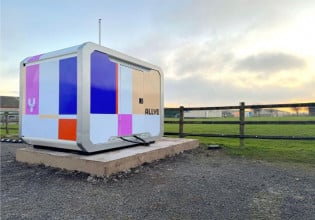The Smart Grid Interoperability Panel (SGIP) is one of four organizations selected by the U.S. Department of Energy SunShot Initiative to lead the Orange Button initiative, which will streamline the way the solar industry establishes and manages data. In order to boost solar bankability, the four organizations – SGIP, SunSpec Alliance, kWh Analytics, and the National Renewable Energy Laboratory (NREL) – will work together to tackle the challenge of creating a widely adoptable, unified data standard for the solar industry.
Orange Button aims to simplify and standardize solar data so that state and local governments, customers, utilities, financiers, solar companies, entrepreneurs, and other stakeholders can exchange quality data. Because access to high quality data impacts more than half the total price of a residential PV system, a robust data infrastructure for the solar industry is needed to enable rapid and seamless data exchanges between producers and consumers of solar data. By creating solar data standards, open marketplaces, and tools for accessing data by the private sector, Orange Button aims to reduce transaction inefficiencies and improve market transparency in a self-sustaining manner.
SGIP’s role is to manage stakeholder engagement and strategy associated with solar bankability as well as work alongside the Energy Department to help evaluate the progress and results of the Orange Button working group.
“This collaborative effort can help to drive down costs associated with solar projects, help project managers get better financing terms, and make investing in solar more compelling,†said Sharon Allan, president and CEO of SGIP. “Leaders of the Green Button Initiative demonstrated that a cross-sector, industry-wide initiative can be successful, and SGIP is well positioned to take a similar approach to engaging stakeholders and deploying more solar assets.â€
SGIP will convene industry leaders to identify the use cases and frameworks required to develop broadly applicable data standards for the solar industry. Allan added, “Working in an open, industry-led process, we will spur the creation and adoption of de facto standards, and ensure their rapid transition into the daily operations of the broader solar market.â€
By creating a standard, robust data infrastructure for the solar industry, banks and financiers can more easily analyze solar assets and integrate more solar into their portfolios. “We believe a reduction in the cost of capital as a result of better access to solar data will reduce risk and could result in savings of nearly $9 billion over the next 10 years to solar users,†said Aaron Smallwood, SGIP Director of Technology Operations.
In addition, this collaborative effort relies on participation from a vast collection of industry participants, including developers of solar generation, inverter and grid-integration technologies, as well as financial and real estate community members who interact with the solar industry.
In order to complete this work, the four Orange Button awardees will collaborate to achieve the program’s overall goals. Teams will work in tandem, collaborating and exchanging deliverables across the three strategic phases of the Orange Button initiative: Convene – Join us as SGIP kicks off Orange Button by convening stakeholders and managing working groups that will define the requirements of an industry-wide solar data exchange and integrate data standards across the life cycle of a solar project.
Define – SunSpec Alliance will build on the results from the convening stage of the project by formulating data taxonomies, interoperability standards, and codes of conduct. This phase will establish an open, commercially embraced solar data exchange system comprised of uniform data taxonomy, information models, application program interfaces, compliance test suite, and reference software. This new solar data exchange program will enable the free flow of data between commercial software products that address all aspects of the solar asset lifecycle.
Integrate – The kWh Analytics team will develop a data format translation tool, which will instantly translate original data formats into the data standards, significantly reducing the effort and time required from data standards adopters. Meanwhile, NREL will develop a platform to enable data sharing for the solar ecosystem, community, and marketplace, in support of consensus-based data standards.
Who Should Participate in Orange Button? Stakeholders interested in establishing data interoperability standards throughout all sectors of the solar industry are invited to participate in Orange Button. Here’s a list of working groups being formed by SGIP: Deployment: In relation to permitting, installation, grid connection and contracting, this group includes building code and safety standards stakeholders, as well as permitting officials. Finance and Insurance: This team is engaged in supporting efficient finance for projects, as well as consumer-facing financial products. Both solar stakeholders and institutional investors can participate to improve transaction efficiency for the solar industry. The team will also look at integrating standards into tax and accounting systems.
Real Estate: This team is focused on valuation matters for existing assets in residential and commercial real estate. Grid Operation: This group includes professionals studying operational issues. Fleet Production & Maintenance: This group aims to help stakeholders in every step of the O&M process, including best practices and cost models. Architecture: This group will investigate needs and best practices for ensuring data interoperability across the solar lifecycle, from project development to decommissioning. Security: The group covers data security and consumer privacy issues.






